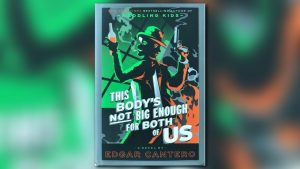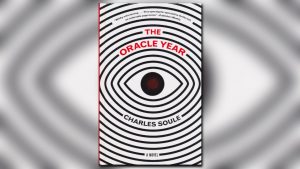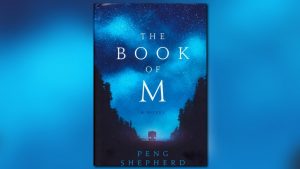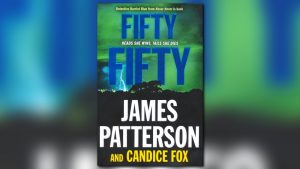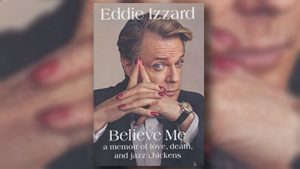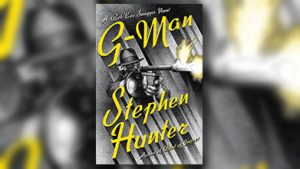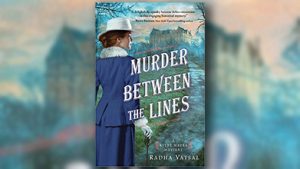In Rick Springfield’s debut novel, Magnificent Vibration, Bobby Cotton embarks on an existential journey after finding a direct phone number to God in a self-help book called Magnificent Vibration: Discover Your True Purpose.
He teams up with Alice, a savvy travel companion, and they set out on a hilarious conquest to find salvation for themselves and the world.
VOICEOVER: And now an Eight original production.
VOICEOVER: Books & Co. is made possible by the Virginia G. Piper Center for Creative Writing, serving writers and readers in the Phoenix metropolitan area, the state of Arizona, and the world.
ALBERTO RIOS: Welcome to "Books & Co". Bienvenidos todos. I'm your host Alberto Rios, and we're joined by author and musician Rick Springfield. We'll talk about his most recent novel, "Magnificent Vibration," published by Touchstone, and imprint of Simon & Schuster. Welcome, Rick.
RICK SPRINGFIELD: Thank you very much.
ALBERTO RIOS: This is quite a book and quite an endeavor for you. You are known in many spheres, and now as a novelist. Can you tell us a little bit about what this book is without giving anything away, "Magnificent Vibration"?
RICK SPRINGFIELD: It's an extreme novel to say the least, I think. It starts out, it begins with a 32-year-old guy who's just gone through a brutal divorce, hates his job and thinks his life is over and steals a self-help book, "Magnificent Vibration," Discover Your True Purpose. And in the inside cover there's a handwritten note, 1-800-callGod. So he does on his cellphone and eventually he finds out it is God eventually, and God has a bit of an attitude, upset with the way humanity has been dealing with his beautiful planet.
ALBERTO RIOS: All sorts of things happen. That idea, I think from the beginning we're either going to laugh or take solace in that, the possibility that something like that could happen. Or what are you talking about here? That's so silly. But he, I think, weaves the two strands together so there's a lot of humor here starting from the beginning.
RICK SPRINGFIELD: It's very dark humor, certainly.
ALBERTO RIOS: I think humor is what we probably ride throughout the book, even though the darkest parts of it. It is dark humor but it is buoyant, as well. Especially when he is doing like, if we can say it without giving anything away, when he's speaking with God. How did you come up with that idea? How do you script God?
RICK SPRINGFIELD: There's probably a part of my view, but also it kind of writes itself once you -- the characters kind of -- I was kind of a little put out that God had such an attitude in the book when I was writing. Oh, really? I guess so. But you know, he's -- it's Horatio, the guy in the book, he's a good foil for that. I've always wanted to have that option to speak with God, and never had a -- I don't mean by praying and communicating, I mean Hello, God, this is me. Is that you? So I wanted to know what would happen with that and how that would go. I was surprised to find as it unfolded that God was pretty upset with the way we were making a mess of his planet. It's not a message book at all, but there is a little bit of my beliefs that we're getting close to a tipping point with what we are doing to this planet. They have posted the article about ice being eaten away from underneath the Antarctica, and there's no coming back from that, that's the dark humor of it.
ALBERTO RIOS: We might as well start with the seriousness, there's so much humor, and we'll be talking about that. But have you some moments that are -- you call this an extreme novel. I think that's true because you've got multiple speakers, God and Horatio and some other characters, and you've got other characters that own this same book, and they have that same little notation inside theirs, and they have their versions of that. Along with all of that we have a foray to Loch Ness, and we have an encounter with somebody people might be familiar with at Loch Ness. You talk about an earth spirit basically, the Numa, the vital spirit of something that the earth holds unto itself, different from God. Maybe you could talk about that distinction.
RICK SPRINGFIELD: I've always viewed the earth as a living organism. I think we're all part of it. It's not an original idea, but I've always truly felt that and often joked, it's kind of us against the earth and I hope the earth wins because we're not -- you know, if we continue the way we're going, there's not going to be much earth left. But yeah, it's something that in the story, that God imbues the earth with this awareness, and creates everything God creates has life. You know, from the smallest string, if you believe in string theory, to the grand cosmos.
ALBERTO RIOS: Uh-huh.
RICK SPRINGFIELD: It's all alive.
ALBERTO RIOS: You go on to sort of extend that idea, though, and talking about yin and yang, that there isn't good without bad and they both occur simultaneously, and that plays into the novel.
RICK SPRINGFIELD: I believe that. I actually discovered that, I knew that principle but I discovered it for myself when my first record, "Jesse's Girl" was taking off. As it was going up the charts my dad died. You know, there's never --
ALBERTO RIOS: Yeah.
RICK SPRINGFIELD: Upside of that is when something dark happens, I really strongly believe that something good comes with that, too. That's the balance of life, that's the yin/yang of life. Everything is in balance, there's no up without a down, no black without white, no night without day, no life without death. It's a concept I explore in the book.
ALBERTO RIOS: You do. I like that it's almost set apart, and almost not of the earth. Nor is it of God, necessarily, it is true innately.
RICK SPRINGFIELD: Yeah. It came out of -- I studied Taoism for a while, and Taoism's main tenet is balance. The earth -- I mean, the universe is in balance, you just have to let it be. We all try and muscle it our own way and it really doesn't do anything.
ALBERTO RIOS: The ecstasy of the unbalanced person, gets all the good.
RICK SPRINGFIELD: Right.
ALBERTO RIOS: You have these different speakers now. So we have -- we have God, we have I guess you could even say somebody speaks at Loch Ness, we have a girlfriend, a nun on hiatus, a crisis of faith, Lexington Vargas, we've got this little ragtag group. They find themselves coming together. How did you think that up? Why did we need all these different speakers?
RICK SPRINGFIELD: I wasn't sure. It really -- I didn't have an arc for the story, I wrote the way I write it, I just write the first sentence and then go from there. I enjoy the revelation as I write it. Which is why I am writing the sequel now as I wanted to see what happened after, you know, it ends with a hanging moment, and I wanted to see how it ends.
ALBERTO RIOS: That's a very poetic approach, being willing to be surprised yourself.
RICK SPRINGFIELD: That's the joy of writing for me. All through writing, and what I'm writing now, I write on my laptop and paste questions on the yellow stickies, and the answers come.
ALBERTO RIOS: Just as a physical, practical consideration when reading through the book, there are different thoughts, different approaches for the different voices.
RICK SPRINGFIELD: Yeah.
ALBERTO RIOS: Did you give pragmatic consideration to that?
RICK SPRINGFIELD: Oh, very much so, yeah.
ALBERTO RIOS: I wonder if it's a big idea among people who make books. Do the different fonts inherently have voice? Did they suggest themselves to you as being representative of God?
RICK SPRINGFIELD: I thought they did, certainly the --
ALBERTO RIOS: They weren’t chance?
RICK SPRINGFIELD: Like the names, the names are very important to me, too. I just don’t say I'll name this character this. I look up the meanings or it it belongs to somebody else, it means something to me. But I have ADD, sorry, I lost the thread. What was I saying?
ALBERTO RIOS: The different names and the different fonts.
RICK SPRINGFIELD: Well, there's no chapters in the book, I wanted chapter 1 at the head of it and leave it at that. But there are no chapters, just all separated by the different voices and fonts. The God font was the toughest one. I could pick whatever font I wanted when I was writing it, but Simon & Schuster have their own specific fonts, they own certain fonts. So we went through a bunch before we found the right one for God. It definitely had to have some flow, and some were difficult to read and we had to find one that look God-like but was easy to read.
ALBERTO RIOS: Had to be a little bit of everything for everybody.
RICK SPRINGFIELD: Yeah.
ALBERTO RIOS: That actually a great consideration. I think people who are readers, it's hard to know what goes into the thought process of something like that. You made just a great observation I didn't catch, and I'm glad to know and think about it now myself. No chapter breaks but the shifts in fonts are the equivalent to what might be chapter breaks, so that you give the reader a breaking place. There's a practical aspect of reading a book, you've got to have some stopping places. The shifts in voices work that way I think.
RICK SPRINGFIELD: Definitely what I was hoping. I try and leave every section with a bit of, oh, man, what happens next, so you want to get back to that section.
ALBERTO RIOS: Excellent. You've got this main character, Horatio goes by a couple of different names, including the endearing Sho that his sister. He is I would say the main speaker. And the funniest speaker and the crankiest speaker, and he's going through all these sorts of things. The limits of the human personality are exemplified really terrifically through him. One of my favorites is after he goes to see the Loch Ness, and has an encounter there, the thing he wants to do most is go back home so he can brag to his friend about it. That's it!
RICK SPRINGFIELD: It's a moment to really show how petty we think sometimes, and we don't think in the grand scheme of things. We think it's all about us, we always think it's all about us. And that was kind of a real -- that came naturally. That was one of those things that just, he didn't know there was more to it. He thinks, that's why I'm here!
ALBERTO RIOS: It made me laugh. I thought the narrowness of that view, given the hugeness of the circumstance, is so wonderfully human.
RICK SPRINGFIELD: Great.
ALBERTO RIOS: And not quite high schoolish but it had a little bit of that thing we don't ever outgrow.
RICK SPRINGFIELD: Right, I have a lot of that, too, that schoolboy humor which shows up a bit in there, too.
ALBERTO RIOS: We'll talk about that. I'd like to take a moment to remind our viewers this is "Books & Co.," I'm you host Alberto Rios, and we're joined today by Rick Springfield, talking about his book "Magnificent Vibration." That title, "Magnificent Vibration," we'll come back to that. You were talking about schoolboy humor. That could be construed as part of the schoolboy humor in the novel. There's a lot of sexuality that's rampant through here. We have a character who might go by the name Woody…
RICK SPRINGFIELD: It's hard to explain.
ALBERTO RIOS: ...it's hard to explain, who plays a major part in this, and deserves a font himself.
RICK SPRINGFIELD: Of his own, he deserves his own font, God bless him.
ALBERTO RIOS: When you are writing, how do you start to approach something like that?
RICK SPRINGFIELD: That just came out naturally. It started -- Horatio has a great and terrible relationship with his -- what word can we use? Is it legal to say penis on this show?
ALBERTO RIOS: You have!
RICK SPRINGFIELD: I just did, thank you very much. And he names him Woody, and that just came up that there's almost a conversation going between them. And that same thing happened actually with a very different element and manner. But in my autobiography, when I'm talking about my depression, suddenly my depression became a character called Mr. D. and I could have conversations with him. That sort of came up naturally. So did Woody come up, so to speak.
ALBERTO RIOS: So to speak. And the character becomes I would say very important. We can laugh about it at first, but it's actually an important dimension to understanding both ourselves as human beings and this character in particular. And there's the wonderful lament that he has somewhere in the book where he -- he says that he can't wait until he's 70 and then he quotes Willie Nelson, when he's outlived his sexuality.
RICK SPRINGFIELD: His libido.
ALBERTO RIOS: And there's something just, again, critical to us understanding how we get through the day. Everybody does it in a different way. You're giving us some insight into these particular characters. It is funny that he has juxtaposed with this crisis that she's having. That can't help but produce some kind of sparkage.
RICK SPRINGFIELD: Yes, he was raised -- he has a weird quirk where he has always linked religion and sexuality.
ALBERTO RIOS: Yeah.
RICK SPRINGFIELD: Just a little bit -- a little bit biographical but not very much. I always thought, you know, we have the fantasy of the hot nun, you know. so he takes that to extremes where as a young kid he gets off watching Julie Andrews in "the sound of music." It becomes his first erotic video. So I thought setting him up with a nun, you know, it hits him in his sweet spot, plus has incredible sexual tension.
ALBERTO RIOS: And it's God at work again, that God who is or is not trying to help.
RICK SPRINGFIELD: We're not sure, yeah.
ALBERTO RIOS: We're not sure. It sort of sets up that dynamic and pushes it I think as we go through there. It turns out this nun also has some body ink. She turns out to be pretty interesting. We don't get the whole story on her. I'll be curious if she shows up big-time in the sequel. But she's got secrets, he gets that. He's so vested in his own secrets, when he sees somebody else might have some, he's a little taken aback.
RICK SPRINGFIELD: Yeah, surprises are always fun in stories, like with this I always try to go the opposite way to where it seemed obvious to go. It seemed very obvious that she had a troubled background. She says not every nun that tries to become a nun is from a pious background. A lot of them are looking to heal themselves.
ALBERTO RIOS: That ties back to what we were saying at the beginning, these moments of seriousness in the midst of this ocean of humor, they become reasonably compelling.
ALBERTO RIOS: There's another moment -- we have that moment with her. But you have another moment I think it was striking with Murray, the dog. You know, things happen but you have a statement, and it just came out of the blue: And I loved it. What an outstanding piece of work is the family dog. That's not a line you would expect to find in here particularly.
RICK SPRINGFIELD: Right.
ALBERTO RIOS: But we come to it, we arrive at that. You earn it from us. We have a reaction to it as a reader. There are some surprises in there that keep coming up. You can't -- it's not a one-note approach.
RICK SPRINGFIELD: Hopefully not.
ALBERTO RIOS: You're the only guide. That said, you had to have a lot of fun writing this.
RICK SPRINGFIELD: I did. I would sometimes laugh out loud, oh, that's kind of weird. And I cried, true, truly, through the final Murray episode. You pull from your own experiences. When you write, you just know you invest in the characters and they become real to you. Which is part of the reason I wanted to continue writing it, because I cared about the characters.
ALBERTO RIOS: You've learned them, you've invented them and now you can't abandon them.
RICK SPRINGFIELD: It's weird, it's a weird thing.
ALBERTO RIOS: You've written in a variety of genres, lyrics, memoirs, and some other thing. How does writing a novel fit into that for you?
ALBERTO RIOS: You're making stuff up. I didn't even know it was possible to event, maybe you're making stuff up.
RICK SPRINGFIELD: No, it's mostly fiction.
ALBERTO RIOS: You might have God's phone number for all we know.
RICK SPRINGFIELD: I may. It's the same muscle, writing is writing. Ray Bradbury wrote a great how-to book. He said write every day, always, always write. It's a muscle and the more you work it the better, the stronger it gets.
RICK SPRINGFIELD: I've written songs for years. It's not like I suddenly stepped off in another direction and said I'm going to write a novel and it's completely different, it's very much the same thing. The same drive in me, looking to make something as unique as I can that I enjoy, and hopefully others will enjoy. That's basically the drive with songwriting, too. Basically wanting to put an experience into -- your human experience is what we all relate to, because we all have the same basic issues. So it really wasn't a giant side step to start writing that, at all.
ALBERTO RIOS: Is it too far afield to think of the different strands in here as songs, is that an odd way to think about that?
RICK SPRINGFIELD: No. It's probably a good analogy. A song is basically about a moment and there are lots of moments in a book. I would think that was why it's written the way it is, little short pieces that are easy to read. Probably actually a good analogy.
RICK SPRINGFIELD: Probably writing songs probably helped me craft that, the way it is, good or body, because of my years of songwriting.
ALBERTO RIOS: What do you think this pushes you toward now? I know you're talking about a sequel. But do you feel vested now in fiction? Is this where you'd like to be for a while?
RICK SPRINGFIELD: I'd like to see where it goes, sure. I can do it and the other things I love to do, it's not like I have to put it on hold and put the soaring and songwriting on hold. I always have my computer with me and on the planes, I'm always working and it's relaxing for me. It keeps me excited. This is what I do with my depression, I turn it into something. I try to create something with it so it's not all --
ALBERTO RIOS: No, no, makes a lot of sense. The religion here, I wonder if we can push that a little bit. There's a little bit of a funny line where you mix high thought with low reaction. You have a line, then what's all that thunder bolt and lightning stuff in the Old Testament?
ALBERTO RIOS: The answer is, "Did you just quote Freddie Mercury?
RICK SPRINGFIELD: They kind of gotta have ADD?
RICK SPRINGFIELD: God and Horatio, that just came out writing a dialogue, it wasn't planned or anything.
ALBERTO RIOS: You keep mentioning it as ADD. It's kind of a realization that as human beings we don't always make sense. When you write a book, you almost have to make much more sense -- even though you're making it up, then when we're having a regular conversation.
RICK SPRINGFIELD: If you close your eyes and listen to two people talking, it goes all over the place. Both have their agenda and they are trying to fit their agenda in.
ALBERTO RIOS: This has a mix of things, and also a statement about humor which is a good one. You talk about, it's God speaking saying that comedians are some of your smartest people.
ALBERTO RIOS: Did you pay god to say that?
RICK SPRINGFIELD: No, I think it's really true. We are that tortured lot and they have had to look in a lot and the ones I've encountered have great ideas. I wish some of them would run for office, you know?
ALBERTO RIOS: We have some of the great thinkers have... that are human.
ALBERTO RIOS: And it's quiet.
RICK SPRINGFIELD: Humor is a sign of intelligence, too.
ALBERTO RIOS: Certainly a sign of thinking, for sure. You have some personal traits in this too and I wonder where those come from. Horatio keeps worrying about his ears for example. Those they are like big elephant ears.
RICK SPRINGFIELD: It took a while for me to grow into my ears as kid, my mother cut my hair real short.
ALBERTO RIOS: Thanks mom.
RICK SPRINGFIELD: I had always had a bit of an issue growing up with them. Yeah, some of that kind of stuff I took from my old life. I thought it was funny and would add a little to the character. Even from the character, you wouldn't say, oh, that's Rick Springfield. But there are parts of me in all those characters.
ALBERTO RIOS: I'm going to ask you a curious question. Did you have a favorite character, after you evolved all of them, they all grew, you can't let them go. Did you have --
RICK SPRINGFIELD: I liked Murray.
ALBERTO RIOS: I think that's a good call. Murray -- it's a short part.
RICK SPRINGFIELD: Yeah.
RICK SPRINGFIELD: But he's sweet and he's -- he's a lovely example I thought of a dog.
ALBERTO RIOS: With that I want to thank you. We've been talking with Rick Springfield, talking about his latest book called "Magnificent Vibration." I am Alberto Rios for "Books & Co.," please join us again next time when we'll be bringing you another good book. Thanks, Rick.





